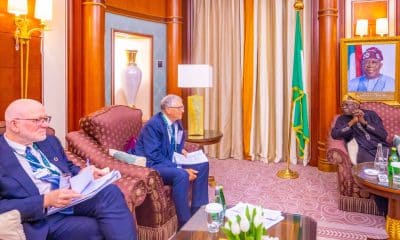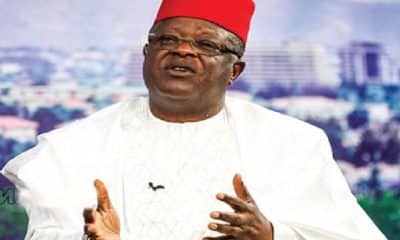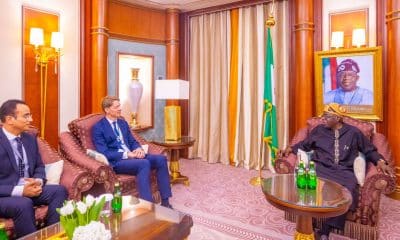Editorial
Rubber-Stamp National Assembly? Not Again!

There were at least three developments this week that gave the current National Assembly away as being out to break a new record in rubber-stamp legislating. The feelers in this early going have left many a Nigerian wondering if the Senator Godswill Akpabio-led parliament won’t worsen the despicable nadir to which its immediate predecessor fell in terms of crassly ingratiating itself to the Buhari government. Indeed, the disturbing signals to be highlighted shortly, pose a serious danger to democracy and public accountability in Nigeria as they call to question the utility of the staggering amount which the country spends in maintaining the National Assembly and its members.
It all started with President Bola Tinubu announcing the intention of his government to disburse N500bn to 12 million households as a palliative measure to mitigate the impact of the removal of fuel subsidy on vulnerable Nigerians. This will however require the approval of the National Assembly which was given post haste by both chambers, without care that the intervention which budgets ₦8,000 to each of the households for a period of six months elicited widespread criticisms from Nigerians. The condemnations were so deafening that presidential spokesman, Dele Alake came out to announce a review of the conditional cash transfer programme after the proposal has been approved by federal lawmakers, pointing out that the rescission “is in deference to the views expressed by Nigerians against it”.
Now, it wasn’t as if strident criticisms of the poorly thought-out palliative weren’t there when it was tabled before the National Assembly for approval. The lawmakers simply ignored the concerns of the people who they are meant to represent and swiftly passed the amendment of the N819 billion Supplementary Appropriation Act, which the N500 billion will be drawn from. These pliant lawmakers should be embarrassed that despite letting the proposal sail without raising necessary objections, the executive has now seen the need to review the initiative. Who needs a National Assembly that cannot carry out simple checks and balances!
The apparent indolence of the 10th National Assembly also writs large in their failure to carry out due diligence or raise critical questions on how the proposed conditional cash transfer will equitably get to vulnerable Nigerians who sorely needed it. They couldn’t even bother to demand an audit of the National Social Register where 15.7m Nigerians are said to be listed. A review of this register by the new government should have been a priority given that it may just be filled up with ghost people whose identities cannot be verified by NIN and there have been allegations that it is skewed in favour of a certain part of the country. Yet the National Assembly overlooked all the irregularities with this register not minding that it had been touted as the means through which the funds they are approving would be disbursed.
As it would turn out, the National Economic Council, NEC, read the executive arm of government, yesterday played the role of the federal parliament following its announcement that “We need to face the problem of the fact that we don’t have a credible register”. There was a near consensus among the NEC members on questions about how names in the so-called national social register came about. In 2016, the federal government established the national social investments programme (NSIP) to “tackle poverty and hunger” across the country. To implement the N25bn programme, the Buhari government created a national social register, comprising names of vulnerable people and households across the country.
Rising from its meeting at the Presidential Villa, Abuja, the council chaired by Vice President Kashim Shettima revealed that the register was replete with integrity issues and that it is impossible to digitally transfer money to the poorest of the poor, the majority of who are unbankable. Yet, as vague and unreliable as this social register is, that was what is penciled down to be used at the time the National Assembly was meant to vet and approve the proposed cash transfer palliative through a national social register now dismissed as not credible. A big disappointment as they failed to scrutinize the appropriation amendment bill sent to it by the President. While governors who dominate the membership of the NEC May just be working an angle by discrediting the social register, they won’t have got the chance to be opportunistic if the National Assembly did their job by verifying the controversial register.
While Nigerians are still trying to come to terms with this letdown, the Senate President, Godswill Akpabio threw caution to the wind by wearing Tinubu’s styled headgear to the plenary. To better appreciate the contradictions hereto, imagine a David Mark spotting President Jonathan’s signature bowler hat to preside over Senate plenary. He never did because that is wrong and would pass the wrong message to the world. Akpabio must desist from sacrificing the hallowed institution he leads just to be in the good graces of the President. By wearing the said hat, the Senate President may just have made the sort of statement by his predecessor that they would endorse whatever the President proposes to them.
Naija News rejects another legislature that would be an appendage of the presidency. While a harmonious working relationship between the executive and legislature is good for the smooth running of affairs of the country, this should not be at the expense of the fine principles of separation of powers and checks and balances. If Akpabio and Speaker Tajudeen Abbas insist on furthering their fawning disposition because they are beholden to the President, those in the opposition and conscientious members of the ruling party must do all that is legally necessary to protect the integrity of the National Assembly. The President’s antecedents in Lagos State as governor and subsequently kingmaker should make these lawmakers very vigilant.
It is a good thing that the 10th Senate is so diverse that while the ruling APC has 59 senators, PDP has 36, LP 8, SDP 2 NNPP 2, APGA 1 and YPP 1. Being 50 members strong, those in the opposition must band together to ensure that the upper legislative chamber does right by Nigerians at all times. This patriotic duty should even be easier in the House of Representatives where the APC has 162 seats, PDP 102, LP 34, NNPP 18, APGA 4, ADC 2, SDP 2 and YPP 1. On the basis of these compositions, this newspaper is certain that the 10th National Assembly enjoys enough plurality to assert its independence and resist being turned into an extension of the presidency. As they say, whoever is the Senate President or Speaker is merely the first among equals. Members of the 10 National Assembly will be well advised to subject all other considerations and loyalties to the interest of Nigerians who voted them into government to be their representatives. Nigerians are watching!












